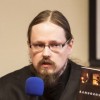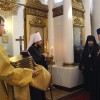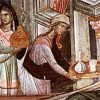From the editors: Few days ago we published Fr. John Tanveer’s appeal to help the Orthodox Christians in Pakistan who have suffered from the recent flooding. After this publication we’ve got a lot of questions about Fr. John and the Orthodox mission in Pakistan. We offer you a translation of Fr. John’s story which fist appeared in Russian in July, 2001 on the Russian-language version site of Pravmir.com.
In recent times, since the killing of Osama Bin Laden, only alarming news has come out of Pakistan, but even before that it wasn’t the most joyful news. In particular, we regularly heard about the difficult condition of Christians in this predominantly Muslim country. Things being as they are, it would seem that there is no basis to hope for any sort of growth of Christianity among the inhabitants of Pakistan.
But, in fact, there is now a functional Orthodox mission in Pakistan, headed by a Pakistani priest, and already consisting of about five-hundred newly-converted Pakistanis. The center of the mission is located in Lahor, where Fr. John Tanveer regularly performs divine services in his own home. This is a very young mission, only a few years old. It began with a former Catholic priest.

Fr. John Tanveer
Fr. John was born into a Catholic family and, after he had received the appropriate education, was ordained a priest in the Roman Catholic Church. Beginning in 1986, he served in a parish of the diocese of Lahor and also taught in the local seminary.
In 1990, a retired Greek general visited the Catholic сhurch where Fr. John was serving. He was looking for an Orthodox church. Of course there was none there at the time. A conversation started up between the two of them about Orthodoxy. This conversation would set Fr. John’s course for many years to come.
As he later recalled, “This meeting generated in me a desire, even a thirst to know more about Orthodoxy, but I couldn’t find any literature about it in Pakistan. I myself could not understand why my heart was so drawn to Orthodoxy. I was already a Catholic priest, after all.”
In May of 1993, Fr. John had an opportunity to visit Australia:
“I was in a Catholic environment, but somehow I felt that God was giving me a chance to encounter Orthodoxy. One evening while I was travelling with a group of people from Melbourne, a certain lady asked me if I wouldn’t like to attend an Orthodox Liturgy. I said yes immediately. She said that I should be ready at eight in the morning.

Fr. Johns Tanveer with his flock
“On the following day she came to pick me up and took me the Church of Peter and Paul, a Ukrainian parish of the Patriarchate of Constantinople. The holiness of the Divine Liturgy made my soul tremble within me; the singing of the choir, the fragrance of the incense, the flames of the candels, the faces on the icons — all of this gave me the intuition that I had found my true home.
“When the people were going to Communion, I went with them. But my acquaintance held me back, saying that Catholics couldn’t do this. After the service I wanted very much to meet with priest, but it didn’t work out.”
Upon returning to his homeland, John Tanveer, with even greater enthusiasm, began to discuss Orthodoxy with his friends, with his parishioners, and with students in the seminary. He collected more and more information on the Orthodoxy Church. This was a bit awkward, since the administration did not entirely approve of his interest.
The more Fr. John discovered about Orthodoxy, the more he spoke of it in homilies and lectures. In 1996 this began to strain his relationship with his bishop, whom Fr. John told that he had discovered many doctrinal differences between the Catholic and Orthodox Churches, and the he considered the Orthodox Church to be the One Holy Catholic and Apostolic Church.
After this, Fr. John left serving and teaching. He left Catholicism altogether.
Now he had to look for work. He became a journalist for the Lahor newspaper “International Press.” In 1997 he married and later had three children. During all this time, Fr. John sought the opportunity to become Orthodox.

He wrote to his friends in Australia with a question about this, but received no reply. Finally, in summer of 1998, he re-established contact with the same Greek general whom he had seen seven years prior, and asked to deliver a request to the Greek Church. The general delivered a letter to Metropolitan Nikita of Hong Kong and the Northern Asiatic (Patriarchate of Constantinople).
In Fall of that same year there came a reply from the Metropolitan, with an invitation to begin a dialogue about how to become Orthdoox. “I agreed joyfully, but the next answer came only after three years. It was as if God was playing hide-and-seek with me,” says Fr. John.
“In 2001, the priest Daniel Toynby came to Pakistan from Singapore with instructions from the Metropolitan to investigate the possibility of establishing a parish in Lahor. At the time of the Vespers of Forgiveness, he told me and my fellow parishioners that he would certainly speak to His Holiness about our reception into Orthodoxy. Fr. Daniel then departed, and another long silence began. Not until September of 2003 did Vladyka’s Nikita’s secretary call me and tell me that he would be visiting Pakistan personally.”
Metropolitan Nikita arrived, and the two developed a sincere rapport. It seem that the doors of Orthodoxy were opened wide to the Tanveer family. But after Vladyka’s departure, there was again no answer to any letter.
“At that I nearly lost hope and almost became disillusioned,” Fr John relates, “I understood that the Metropolitan was a very busy man, but I didn’t understand why the path to God was so difficult for me. In these dark moments, my wife Roza supported me, saying: don’t be shaken, the Lord is with us. The day will come when he will allow us to become Orthodox.”

This day was the 27th of June in 2005, when Metropolitan Nikita again visited Lahor and received Fr.John’s family and his community into Orthodoxy. He also blessed him to preach to the other Pakistanis.
Fr. John, still a layman at that time, became the head of the Orthodox Mission and developed its activity. He gave lectures and seminars, printed article about Orthodoxy — here his experience as journalist came in handy – and dispatched help to the needy. In time there were about three- hundred Orthodox Pakistanis, and their number continued to grow. Soon the state authorities officially registered the Orthodox mission in Pakistan.
But the community sorely lacked a priest, and John Tanveer was admittedly the best candidate. With the blessing of Metropolitan Nikita, he began to prepare himself to enter Holy Cross Seminary in the U.S. He wasn’t able to go in 2005, nor in 2006, since he was denied an American visa.
Nevertheless, he studied the materials for distance learning and, in 2007, he was sent to the Saint Nicholas Monastery in Greece for instruction and preparation for ordination. At that time, Metropolitan Nikita was transferred from the cathedral of Hong-Kong, so the ordination was delayed, then performed by the new Metropolitan Nektary, in the Fall of 2008 in Athens.

Upon his return, Fr. John started performing the divine services in his apartment in Lahor, where about fourty or fifty parishioners would assemble every Sunday. A greater number simply could not fit. The number of the Orthodox grew, not only in Lahor but in some neighboring villages as well. A few Orthodox books were translated into Udru (the main language of Pakistan) and published. They were distributed free of charge, due to the poverty of the parishioners.
In general, the quality of life in Pakistan is not very high. But for the Christian minority it is even lower. Only for the Catholics, who have been here for a long time, is there an established social sphere wherein one has certain opportunities for work, education, and so on.
But when Catholic Pakistanis become Orthodox, they become estranged even from that community, and even experience a certain pressure. Matushka Roza, for example, Fr. John’s wife, worked until recently as an English teacher in a small Catholic school. Their own children also studied there. But at the beginning of the new school year, she was laid off and the children disenrolled, nor were they able to get into another Catholic school. As they weren’t alone in the situation, Fr. John established a home-school for Orthodox children, and then another school in a village not far from Lahor.


The Orthodox are the poorest part of the poorest community in Pakistan. But in these people, the saying of the Apostle James is fulfilled: “Has not god made the poor of the world to be rich by faith and inheritors of His Kingdom, which He has promised to those that love Him?” (Jas. 2:5). And they are so firm in their newfound faith that, even in the face of the adversities the remain faithful to Orthodoxy. Fr.John lives the life of his parishioners, striving to help them get education, medical help, and even groceries — although he resources are very limited.
For a while the parish published a monthly Orthodox journal, and also organized expeditions with public discussions of Orthodoxy. But now these things have stopeed due to the lack of finances.


The chief difficulty for the Orthodox, according to Fr. John, is the lack of their own temple. This naturally limits the growth of the parish and of the whole mission. But right now the Orthodox don’t even have the money ($6,000) to purchase a small piece of land for their future temple. They do not have the necessary ecclesiastical things, vestments, icons, lampadas. Many necessary things are lacking for the education of the children and youth of Orthodox families.
But the Orthodox Pakistanis don’t lose heart. They are happy, insofar as their most important need and demand has been met — to know the truth.
Translated by Jeremy Boor
From the editors: About twenty families from Fr. John’s parish have lost their homes and all of their belongings. Pravmir readers can send aid directly to Fr. John’s mission, and can help by their prayers. The people are in need of food, tents, mosquito nets, medication, and money to help with the acquisition and distribution of aid.
How to help:
Monetary aid for those suffering may be donated to the Orthodox Mission in Pakistan through Western Union.
Wire donations to:
Orthodox Mission in Pakistan
Ghauri House 2
Clifton Colony Street no. 1 Lahore
54600
















